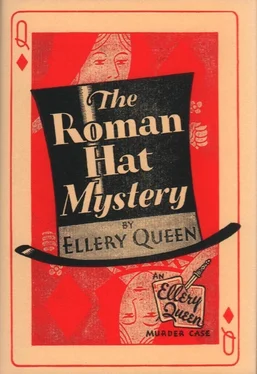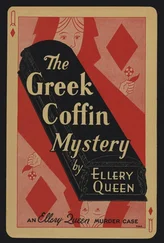The three men took the elevator to the fourth floor and stepped out into the quiet corridor. The Inspector peered about quickly, then punched the doorbell of the Field apartment. There was no answer, although they could hear the vague rustling of someone behind the door. Suddenly it swished open to reveal a red-faced policeman whose hand hovered uneasily in the region of his hip pocket.
“Don’t be scared, man — we won’t bite you!” growled the Inspector, who was completely out of temper for no reason that Cronin, nervous and springy as a racing colt, could fathom.
The uniformed man saluted. “Didn’t know but it might be someone snoopin’ around, Inspector,” he said feebly.
The three men walked into the foyer, the slim, white hand of the old man pushing the door violently shut.
“Anything been happening around here?” snapped Queen, striding to the entrance to the living room and looking inside.
“Not a thing, sir,” said the policeman. “I’m on four-hour shifts with Cassidy as relief and once in a while Detective Ritter drops in to see if everything is all right.”
“Oh, he does, does he?” The old man turned back. “Anybody try to get into the place?”
“Not while I was here, Inspector — nor Cassidy neither,” responded the policeman nervously. “And we’ve been alternating ever since Tuesday morning. There hasn’t been a soul near these rooms except Ritter.”
“Park out here in the foyer for the next couple of hours, officer,” commanded the Inspector. “Get yourself a chair and take a snooze if you want to — but if anybody should start monkeying with the door tip us off pronto.”
The policeman dragged a chair from the living room into the foyer, sat down with his back against the front door, folded his arms and unashamedly closed his eyes.
The three men took in the scene with gloomy eyes. The foyer was small but crowded with oddments of furniture and decoration. A bookcase filled with unused-appearing volumes; a small table on which perched a “modernistic” lamp and some carved ivory ashtrays; two Empire chairs; a peculiar piece of furniture which seemed half sideboard and half secretary; and a number of cushions and rugs were scattered about. The Inspector stood regarding this melange wryly.
“Here, son — I guess the best way for us to tackle the search is for the three of us to go through everything piece by piece, one checking up on the other. I’m not very hopeful about it. I’ll tell you that.”
“The gentleman of the Wailing Wall,” groaned Ellery. “Grief is writ fine and large on his noble visage. You and I, Cronin — we’re not such pessimists, are we?”
Cronin growled, “I’d say — less talk and more action, with all the respects in the world for these little family ructions.”
Ellery stared at him with admiration. “You’re almost insectivorous in your determination, man. More like an army ant than a human being. And poor Field’s lying in the morgue, too... Allons, enfants!”
They set to work under the nodding head of the policeman. They worked silently for the most part. Ellery’s face reflected a calm expectancy; the Inspector’s a doleful irritation; Cronin’s a savage indomitability. Book after book was extracted from the case and carefully inspected — leaves shaken out — covers examined minutely — backboards pinched and pierced. There were over two hundred books and the thorough search took a long time. Ellery, after a period of activity, seemed inclined to allow his father and Cronin to do the heavier work of inspection while he devoted his attention more and more to the titles of the volumes. At one point he uttered a delighted exclamation and held up to the light a thin, cheaply bound book. Cronin leaped forward immediately, his eyes blazing. The Inspector looked up with a flicker of interest. But Ellery had merely discovered another volume on handwriting analysis.
The old man stared at his son in silent curiosity, his lips puckered thoughtfully. Cronin turned back to the bookcase with a groan. Ellery, however, riffling the pages rapidly cried out again. The two men craned over his shoulder. On the margins of several pages were some penciled notations. The words spelled names: “Henry Jones,” “John Smith,” “George Brown.” They were repeated many times on the margins of the page, as if the writer were practicing different styles of penmanship.
“Didn’t Field have the most adolescent yen for scribbling?” asked Ellery, staring fascinatedly at the penciled names.
“As usual you have something up your sleeve, my son,” remarked the Inspector wearily. “I see what you mean, but I don’t see that it helps us any. Except for — By jinks, that’s an ideal”
He bent forward and attacked the search once more, his body vibrant with fresh interest. Ellery, smiling, joined him. Cronin stared uncomprehendingly at both.
“Suppose you let me in on this thing, folks,” he said in an aggrieved voice.
The Inspector straightened up. “Ellery’s hit on something that, if it’s true, is a bit of luck for us and reveals still another sidelight on Field’s character. The black-hearted rascal! See here, Tim — if a man’s an inveterate blackmailer and you find continual evidence that he has been practicing handwriting from textbooks on the subject, what conclusion would you draw?”
“You mean that he’s a forger, too?” frowned Cronin. “I never suspected that in spite of all these years of hounding him.”
“Not merely a forger, Cronin,” laughed Ellery. “I don’t think you will find Monte Field has penned somebody else’s name to a check, or anything of that sort. He was too wily a bird to make such a grievous error. What he probably did do was secure original and incriminating documents referring to a certain individual, make copies of them and sell the copies back to the owner, retaining the originals for further use!”
“And in that case, Tim,” added the Inspector portentously, “if we find this gold mine of papers somewhere about — which I greatly doubt — we’ll also find, as like as not, the original or originals of the papers for which Monte Field was murdered!”
The red-haired Assistant District Attorney pulled a long face at his two companions. “Seems like a lot of ‘if’s’” he said finally, shaking his head.
They resumed the search in growing silence.
Nothing was concealed in the foyer. After an hour of steady, back-breaking work they were forced reluctantly to that conclusion. Not a square inch was left unexamined. The interior of the lamp and of the bookcase; the slender, thin-topped table; the secretary, inside and outside; the cushions; even the walls tapped carefully by the Inspector, who by now was aroused to a high pitch of excitement, suppressed but remarkable in his tight lips and color-touched cheeks.
They attacked the living room. Their first port-of-call was the wall, searching for signs of tampered woodwork. And still the big clothes closet inside the room directly off the foyer. Again the Inspector and Ellery went through the topcoats, overcoats and capes hanging on the rack. Nothing. On the shelf above were the four hats they had examined on Tuesday morning: the old Panama, the derby and the two fedoras. Still nothing. Cronin bumped down on his knees to peer savagely into the darker recesses of the closet, tapping the wall, searching for signs of tampered woodwork. And still nothing. With the aid of a chair the Inspector poked into the corners of the area above the shelf. He climbed down, shaking his head.
“Forget the closet, boys,” he muttered. They descended upon the room proper.
The large carved desk which Hagstrom and Piggott had rifled three days before invited their scrutiny. Inside was the pile of papers, canceled bills and letters they had offered for the old man’s inspection. Old Queen actually peered through these torn and ragged sheets as if they might conceal messages in invisible ink. He shrugged his shoulders and threw them down.
Читать дальше












